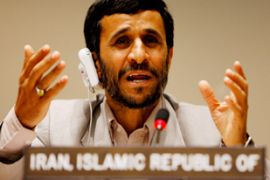UN votes for Iran nuclear sanctions
A defiant Tehran says it will ramp up uranium enrichment in the face of punitive measures.

Iran, however, vowed on Saturday to drastically ramp up its uranium enrichment capacities and rejected the UN sanctions as “invalid” and “illegal”.
Mohammad Ali Hosseini, the foreign ministry spokesman, said that Iran would carry out its plan to install and make operational 3,000 uranium enriching centrifuges at a key nuclear plant, in defiance of the UN resolution.
Such a move would be an important step for Iran towards enriching uranium on an industrial scale. So far it has two cascades of 164 centrifuges at its uranium enrichment plant in the central city of Natanz.
“This new resolution will not be an impediment to Iran‘s nuclear progress,” Hosseini said in a statement published by Iranian official media.
“The Iranian nation, relying on national abilities and within the framework of the nuclear non-proliferation treaty and its undeniable rights, will go ahead with its peaceful nuclear plans.”
Defiant note
In the run-up to the UN vote, the Iranian president had sounded defiant.
“The bullying powers today, in confronting Iran‘s peaceful nuclear technology, are faced with a sea of courageous people,” Mahmoud Ahmadinejad said in a speech.
| “The bullying powers today, in confronting Iran’s peaceful nuclear technology, are faced with a sea of courageous people,” Mahmoud Ahmadinejad, Iranian President |
The UN text warns Iran to comply with the demands, or the council will “adopt appropiate measures under Article 41 of Chapter Seven” of the charter, a reference to non-military sanctions.
“Today we are placing Iran in the small category of states under Security Council sanctions,” Alejandro Wolff, the acting US ambassador, told the council before the 15-0 vote.
Vitaly Churkin, Russia’s UN ambassador, who was successful in watering down parts of the resolution, emphasised that the resolution did not permit any use of force.
A Western diplomat privy to the talks said that Vladimir Putin, the Russian president, had insisted on seeing the final text before the vote.
Putin called George Bush, his US counterpart, to discuss the resolution and they agreed on the need to act, Blain Rethmeier, a spokesman for Bush, said.
‘Unified position’
The two leaders “stressed the importance of maintaining a unified position on Iran’s nuclear programme”, Rethmeier said.
During negotiations, a mandatory travel ban was dropped at Russia’s insistence.
Instead, the draft resolution called on all countries “to exercise vigilance” regarding the entry or transit through their territory of those on a UN list that names 12 top Iranians involved in the country’s nuclear and missile programmes.
It asked member states to notify the Security Council committee that will monitor the sanctions when the listed Iranians show up in their country.
The vote took place exactly two months after Britain, France and Germany first introduced a draft resolution following Iran‘s failure to comply with an August 31 council deadline, to halt its sensitive nuclear fuel work.